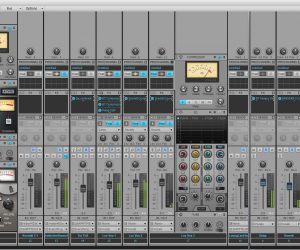
Review: IK Multimedia Philharmonik Miroslav Orchestra & Choir Workstation
When a sample library is released and half the words end in either ‘K’ and ‘V’ you know something pretty serious is being offered. No frivolity here, just remarkable-sounding samples recorded in an exceptional, world-renowned hall.
Lo and behold, another orchestral sample playback plug-in! This time it’s from the people who brought us T-Racks, SampleTank and Amplitube: IK Multimedia. IK Multimedia seems to occupy its own little niche in the plug-in world, and of late, quite a diverse collection of titles resides beneath its stable roof. Before the flood of amp simulators hit the market recently, Amplitube was the most accessible guitar cab emulator available, nay, the only native guitar amp simulator available on the Mac/ProTools platform. My point being, these guys have a respectable history. So, back to their latest gizmo: the Philharmonik Miroslav Orchestra and Choir Workstation (I’ll call it the PMOC, for short, just to save a few trees).
With 7GB of samples and over 1200 separate sounds, this virtual instrument looks to be an attractive option in the plug-in orchestra stakes. PMOC is compatible with everything. VST/DX, RTAS, VST and AU formats all get a thumbs-up, and being primarily a sample player, you won’t need a beast of a computer to drive it. In fact, the engine behind the scenes is the same code used in the company’s SampleTank player, so the plug-in has little impact on the host CPU’s processing speed.
As you can see from the screen grabs, the GUI is an elegant montage of a violin spread width-ways across the screen, with a kind of ‘ancient paper scroll’ section in the middle, which displays the patches loaded into each of the 16 parts that the plug-in’s capable of playing back. Below this is an array of shiny virtual brass knobs for general synth-style control of the samples. The synthesis section is comprised of a typical two-envelope generator, two LFOs, velocity, filter and the usual tuning-type games you can get up to with most respectable sample playback software. There’s also a huge brigade of effects – 20 in total – that are fed via four individual sends for each of the 16 parts. On top of an entire patch setup there are a further four slots for master effects. Suffice it to say, there’s ample editing provision, and most of your bread and butter modulation techniques can be programmed quite quickly and without too much wear and tear on the grey matter.
The thoughtful addition of a Backup button allows saving of all used setups and samples to a user-defined directory for transportation of sessions between studios and collaborators.
Installation is via two DVDs with the install procedure clearly guiding you through the process. A separate manual addresses the install methods for Windows and Mac OS operating systems, along with how to authorise the supplied hardware USB key. The actual USB key looks to be the same hardware device used by Steinberg’s ‘WIBUKEY’. It’s effective copy protection but, alas, yet another dongle to stuff into your already-packed-to-the-gills USB hub. (Surely iLok is a more usable system. At least iLok offers an option if your key is lost or stolen. Proprietary keys require the user to shell out for the entire package again.)
As always, the prime concern is: how does the library sound? In short, it’s very effective. At length, I’d have to fill you in on the origins of the library. The library was recorded originally by Miroslav Vitous in Prague’s Dvorák Symphony Hall. If you’ve not heard the name, Miroslav Vitous was – and is – a violin, piano and bass player renowned in jazz circles for his work in the ’60s and ’70s with folks such as Chick Corea, Miles Davis, Stan Getz and Herbie Hancock. The man played bass with Weather Report, so he’s certainly no slouch with the bass chops. This collection was originally supplied as a sample CD set, winning various awards in the process. According to the folklore, this is apparently a collection Miroslav recorded for his own use, and only released after realising just how much money he’d spent on the project. The Dvorák Hall itself is renowned throughout the world for its elegant acoustics and exceptionally agreeable sound. Personally I’ve never been to the hall, although I have travelled through Prague from time to time; no finer a Pilsener have I experienced in Europe, and so inexpensive! But I digress.
These samples are jolly nice: warm and inviting and incredibly ‘musical’. That may sound daft but these samples really do impart an essence of believability and an emotive concert hall ambience. Well worth the lolly for a no-nonsense, easy to use plug-in, with ample control over a beautifully recorded orchestra.
















RESPONSES